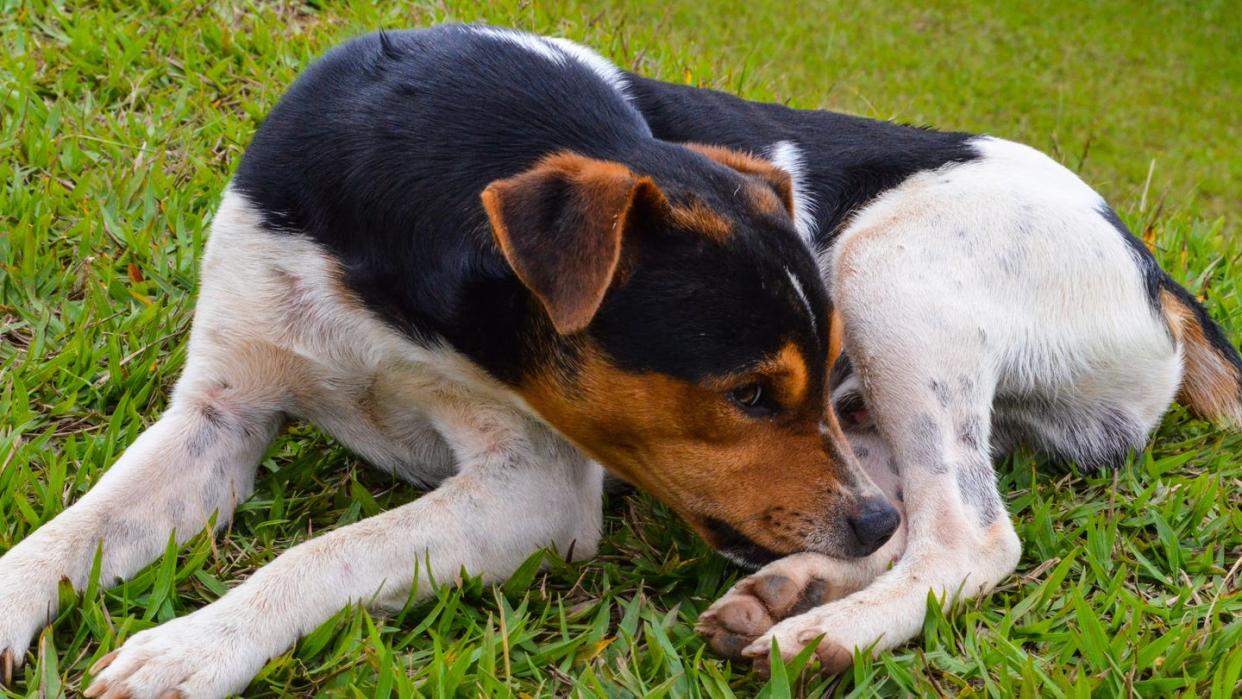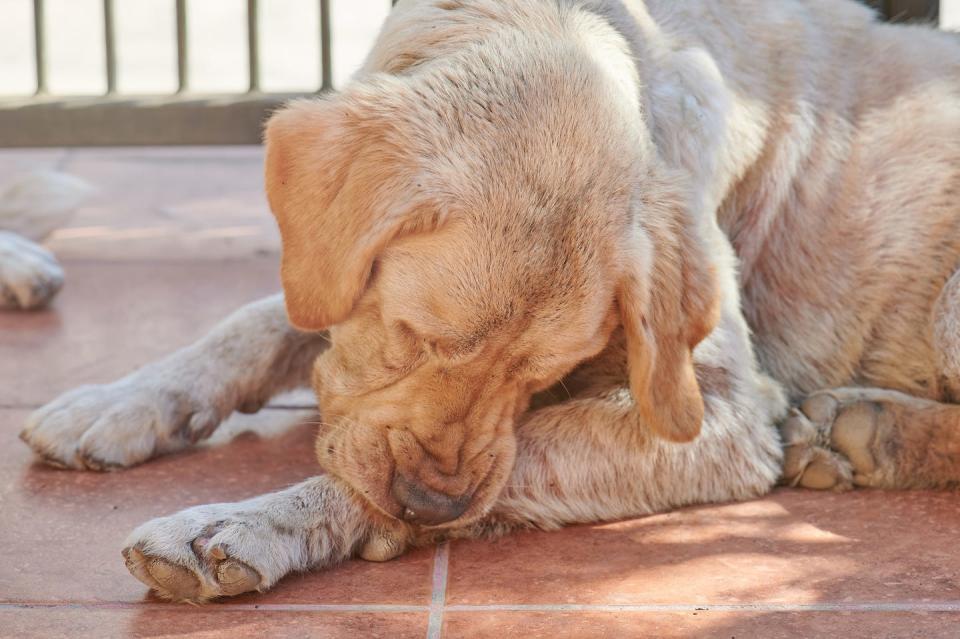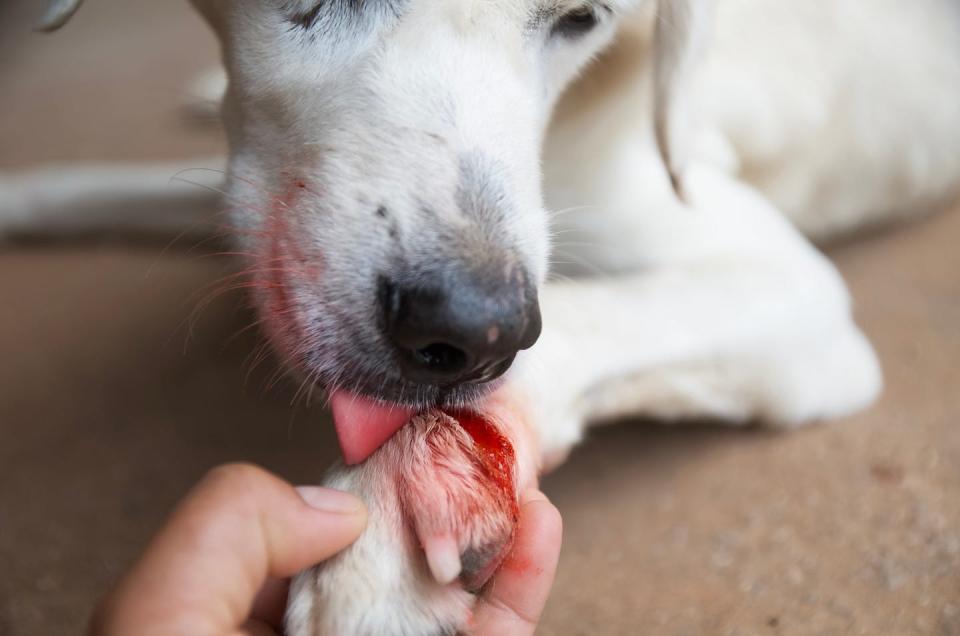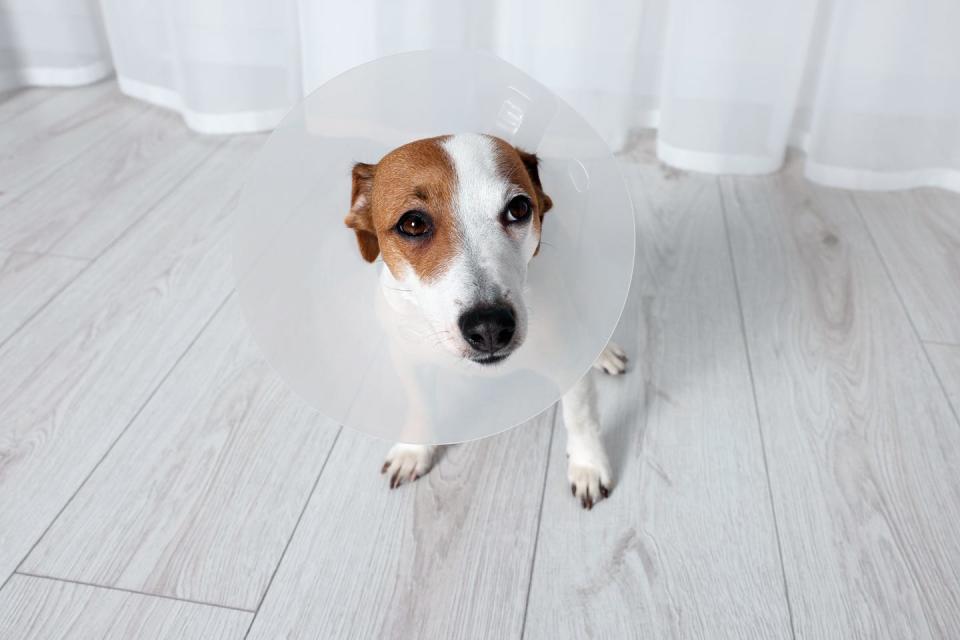Why Do Dogs Chew Their Paws? A Veterinary Dermatologist Explains

By his very nature, man's best friend tends to be a chewer. As every pet parent knows, puppies chew, often to relieve teething discomfort. Small or large, rare breed or not, adult pooches do, too, and it's usually good for them. (Munching on chew toys helps keep teeth clean and jaws strong, among other benefits.) But there's another type of nibbling you might have noticed, one that's probably left you wondering, "Why do dogs chew paws?"
It's common for dogs of all ages to lick their paws and even chew their paws upon occasion, though there is a vast difference between your very good boy freshening up his foot after a muddy walk and his gnawing on it to the point of damage. While a bit of self-grooming isn't cause for concern, if your dog keeps at it obsessively, it's time to get him to a vet. There are a host of health reasons that could be behind it, from allergies to trauma and even cancer.
To find out more about what causes paw chewing, when should you get help for it, how you can stop it, as well as the best way to protect Fido's feet, we checked in with Dr. Fiona Lee, board-certified veterinary dermatologist at Animal Dermatology Clinic. Below, you'll find all the info you need to know to get your furry, four-legged friend back on his...er...paws in no time.

What does it mean when a dog chews their feet?
While a casual chew on one paw might mean he's cleaning himself, anything more prolonged, or involving multiple paws, could mean something else is afoot (sorry, we couldn't resist). According to Dr. Lee, skin issues are some of the more common reasons dogs chew their paws. Allergies can cause severe itching of the feet, with redness and swelling possible. Keep an eye out for hot spots, which are moist, painful, smelly skin lesions that can be worsened by dogs licking and chewing their feet. Environmental allergies to things like grass, mold, pollen, dust mites and mildew may be the culprit.
That's particularly true in what Dr. Lee calls "your classic allergy breeds"—dogs such as bulldogs, terriers and goldendoodles that are prone to this kind of immune system disorder. Food allergies, though less common, to anything from dairy to beef (yes, really), soy and gluten, could also be causing your dog to chew his paws. Dogs are diagnosed with food allergies by an elimination trial. Typically, they are fed a hypoallergenic diet for several weeks. If their symptoms resolve, their former food is reintroduced to see if the symptoms return. However, environmental allergies can often be identified with blood and skin tests.
Other conditions that could cause your dog to chew his paws include:
Secondary infections
According to Dr. Lee, yeast infections are often overlooked by vets. "Cytology slides (i.e. looking under the microscope, an inexpensive bedside diagnostic test) can help diagnose secondary bacterial (Staph) or yeast (Malassezia) infection," she explains. "These organisms normally live on the skin. They've just overgrown because of inflammation due to a primary underlying problem, for example, an allergy." Vets should also "check for Demodex mites and ringworm, for immunosuppressed patients," she adds.Trauma
Sometimes the simplest answer is the right answer. Your buddy might be biting his paw because he burned it on hot pavement, or, as Dr. Lee says, he "stepped on a bee or foreign body, or tore a nail." Trauma should present as acute, with a sudden onset of symptoms, and will often involve just one paw. Other possible paw injuries include frostbite as well as irritation caused by walking on sidewalks and roads treated with rock salt. Overgrown nails can also cause pain and even infections. Keep your pup off the pavement in the summertime (and during wet winters), and make sure his nails are trimmed.Secondary to orthopedic
According to Dr. Lee, everything from limb deformities to gait abnormalities, orthopedic injuries and osteoarthritis can cause a dog to chew his paws. "You'll often see fronds (feathered or hair-like skin projections) on the paw pads that aren't being worn down because of uneven wear and tear as the pet walks," she says. This happens especially to bulldogs, but these fronds in and of themselves aren't usually problematic.Secondary to neurologic
Paw chewing can also be a symptom of nervous system disorders that affect the brain, spinal cord and nerves, such as strokes and dementia. "But it's usually not all four paws," Dr. Lee says. It would more likely look like "chewing one paw to the bone, dragging both hindlegs and chewing at them, etc.," she adds.Other diseases
Autoimmune diseases including symmetrical lupoid onychodystrophy could cause your dog's nails to fall off on all four paws and bring on intense chewing. "Pemphigus foliaceus, the most common autoimmune disease in dogs and cats, often causes crusty paw pads," Dr. Lee notes. So does the metabolic disease hepatocutaneous syndrome (or superficial necrolytic dermatitis), while zinc responsive syndrome may result in scaly paw pads. Cancer may cause paw chewing and should be ruled out as well.Behavioral
Diagnosed by exclusion, this type of paw chewing can be related to stress or anxiety and treated with visits to a behaviorist. "We will try gabapentin/other pain meds," Dr. Lee says, "but often nothing seems to help. But licking all four paws is not a boredom thing, as some owners and vets suggest. There's almost always a true medical issue that should not have Prozac thrown at it."

When should I worry about my dog licking his paws?
According to Dr. Lee, there are signs you can look for that will tell you when your dog should be evaluated professionally for paw chewing or licking. If you need to physically restrain him to stop the behavior, or if the behavior is chronic or recurrent, get him to a vet. If you've already taken him to your primary vet and tried medication to alleviate the itching without success, consider making an appointment with a veterinary dermatologist.
"One of the common things I'll hear owners say is that their dogs aren't 'itchy,' they're just licking a lot," Dr. Lee says. "A dog isn't going to scratch their paw with their other paw— they're going to lick or chew. So, sure, if a dog stepped on a bee and got stung, it's 'normal' for them to lick in the sense that a dog has no other way of showing discomfort and trying to help themselves. But we probably shouldn't let them go to town and just keep licking, because it's not helpful and potentially even harmful."
So, while a couple of paw licks or nibbles here and there isn't cause for concern, what Dr. Lee calls "lollipopping their paws all night until they're discolored brown" is not normal. "The brown staining of the paws is often a dead giveaway that a dog is licking," she says. "It's usually salivary staining and/or Malassezia yeast overgrowth...of course, if there's inflammation (redness, swelling, draining, and/or discharge), that's clearly a problem as well."

How do I get my dog to stop chewing his paws?
He isn't going to be happy about it, but the best way to prevent your buddy from worrying his paws is to put him in a protective collar. Skip the cutesy bubble doughnut-type and opt for a proper, funnel-shaped Elizabethan collar. "It doesn't have to be a hard plastic one that breaks the furniture and people's shins," Dr. Lee says. "But it does have to stop licking."
She also strongly advises pet parents to stay away from bandages, even from a vet, as the primary way to stop chewing. "Bandages get wet—then they must be changed within hours, or else the leg starts melting underneath (maceration)," she says. "Bandages can be too tight. I've seen rubber bands and duct tape around socks, but if it slides even a little, the leg gets destroyed from within (necrosis). And bandaging often just breeds infection underneath."
And as for spraying bitter or spicy-tasting substances on your dog's feet? It's a waste of time and money, and it can actually do more harm than good. "Don't put coconut oil on it," Dr Lee stresses. "That's like feeding the bacteria and yeast. Don't buy supplements or hot spot sprays or that OTC thing that your neighbor swore by. Save the money for a vet visit."

How can I protect my dog's feet?
To start with, keep him off hot pavement in the summer, and away from roads and sidewalks treated with anti-ice substances in the winter. Dog booties might seem like a good solution (and they're so cute!), but they can cause more problems than they solve, particularly for large breeds.
"They can change the normal gait," Dr. Lee explains. "It would be like wearing ill-fitting shoes, and if you're already prone to tearing a cruciate..." (Bigger and heavier dogs like retrievers, German shepherds and rottweilers are more likely to injure the ligaments in their knees.)
Keeping Rover at a healthy weight can also help; some paw lesions like interdigital cysts can be exacerbated by weight. If you suspect environmental allergens are causing itching, be sure to gently clean your dog's feet with unscented baby wipes after they come in from a romp outside.
In general, it helps to get your dog used to his paw being handled before problems occur. Dr. Lee emphasizes the importance of using only positive reinforcement in this training and recommends Fear Free, a program that teaches people how to reduce stress and anxiety in animals. That way, you can help your doggo get back to feeling happy and healthy in no time flat!
You Might Also Like


